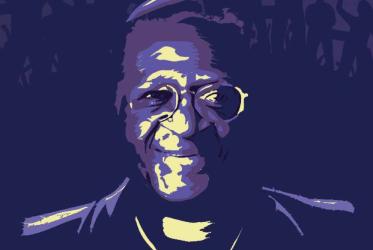Text: Mark 13:1-13
Valedictory sermon by Rev. Dr Samuel Kobia, WCC general secretary
Ecumenical Centre chapel
Monday, 7 December 2009
For my valedictory sermon I have chosen the theme, “Signs of the Times”. In the church and in society, we observe times and seasons. For some of us, the season of Advent has begun its second week. The attention of many people is focused on the start of the Climate Change conference in Copenhagen. For residents of the northern hemisphere, the beginning of winter is fast approaching, while for those in the South summer draws near. But whatever the weather, there is a delight among believers that Christmas is coming.
This last month of 2009 has special significance for me, since I am nearing the end of my formal ministry as general secretary of the World Council of Churches. Still, I know that I am not alone in looking forward to changing circumstances and new opportunities in the New Year.
The calendars of our churches and communities identify occasions for commemoration of the historical cloud of witnesses who surround us. Yesterday was celebrated by many as the feast-day of Saint Nicholas, a figure who has become associated even with the secular observance of the winter holidays. Today is designated in honour of Saint Ambrose, the fourth-century theologian and bishop of Milan.
We began worship this morning singing “Lumière de Dieu”, a song from the Grandchamp community of Switzerland; today, the 7th of December, is the date when members of that ecumenical sisterhood honour their founding prioress. And for the World Council of Churches, tomorrow – the 8th of December 2009 – will mark the 100th anniversary of the birth of the late Bishop Lesslie Newbigin.
I.
Lesslie Newbigin was one of our ecumenical forebears. He was general secretary of the International Missionary Council at the time it became part of the WCC, and afterwards he served as our associate general secretary and director of the Commission on World Mission and Evangelism. Lesslie combined a profound dedication to mission, and the promotion of Christian ideals in society, with an equally deep commitment to the Faith and Order agenda in exploring Christian common ground. He believed that unity is the nature of the One Church that Christ founded, and the establishment of visible unity is the mission of the Church.
Lesslie Newbigin was also an admirable ecumenist in his enthusiasm for crossing cultural boundaries. Raised and educated in the English Presbyterian church, he was sent by the Church of Scotland as a missionary to India. He was instrumental in the creation of the Church of South India, and he served as a bishop of that church both before and after his years of service in Geneva. In retirement, he launched a second career as a professor of mission and ecumenics at the Selly Oak Colleges in Birmingham, England. He was elected Moderator of the General Assembly of the United Reformed Church. He also wrote a succession of books on Christian mission – south and north, east and west. His titles include: The Open Secret; Can the West be Saved?; The Other Side of 1984; and The Gospel in a Pluralist Society. There is also the wonderful title of Lesslie’s autobiography: Unfinished Agenda.
I have told the story before of Lesslie Newbigin’s visit to Elmina Castle in Ghana, where captured Africans were held by slave-masters before being shipped to the brutal markets of the New World across the Atlantic. Lesslie was appalled to see that the British colonizers had cut a hole in the floor of the castle’s chapel so that they could keep watch over the slaves even while they themselves were at prayer. He later expressed his wish that, in contrition for this great crime of the past, an Archbishop of Canterbury or British prime minister might someday come to the chapel and kneel to ask forgiveness.
II.
In 1960, Bishop Lesslie Newbigin was invited to deliver the Peter Ainslie Memorial Lecture, an international ecumenical lectureship named in honour of one of the great leaders of the Disciples of Christ. The bishop chose to give the lecture in South Africa, and to speak on the signs of the times and their meaning for “The Mission and Unity of the Church”.1
As his text, Lesslie took a passage from the 13th chapter of Mark’s gospel, as I have done today. This is the so-called “Little Apocalypse” of Mark, in which Jesus instructs the disciples on the future, and describes the signs and events they would encounter in his service.
In the context of 1960’s South Africa, with its heightened racial consciousness, the bishop described what he discerned to be the signs of that time; three of those signs are:
1st there was a world-wide “reversal in the tides of power” and a fast-approaching “ending of the period of world history dominated by the white races of Western Europe and their offshoots”.
2nd for the first time there was evidence of “a world civilization, covering the whole globe and drawing all races into it”.
3rd the gospel was being passed to newly independent churches, raising the question, “Is the missionary today an asset or a liability to the younger church?”
As in the days of Christ and the apostles, Newbigin said, these were tumultuous times – times when people expect and acclaim messiahs, when people look at events “in terms of an End to which all history is moving”. In such times, there is widespread suffering and the Church is called to bear witness (in Marturia). This witness is the work not of humans or of an institution, but of the Holy Spirit: “It is not you,” says Jesus, “but the Holy Spirit…” And such times are times of confrontation:
“World history is not the story of a gradual ascent toward a perfect world, but the story of a conflict in which the issues are more sharply defined, until the final issue. The crises of history are the foreshadowing of that ultimate crisis… Thus the lines through history are drawn more and more sharply. The process of polarization goes on. And ‘he who endures to the end…shall be saved’.”
(I think it is no coincidence that Lesslie Newbigin repeatedly used the word “sharply” in this passage of his speech. The Sharpeville massacre, where scores of black South Africans in a peaceful demonstration were gunned down by white policemen, had taken place in March of 1960, and the Ainslie lecture was being given just seven months later. The lines in South Africa were sharply drawn, indeed, and the process of polarization was accelerating.)
Lesslie warned that the emerging “single world civilization, though it has its origins in western Christendom, is a culture severed from its religious roots”. To the extent that much of the world is aware of Christianity, he said, because of the disunity of the churches “instead of seeing the face of its one Saviour, the world sees a monstrous gallery of caricatures. And, to make our sin more sinful, we [in church leadership] are fertile in justifications for every one of these divisions.”
It would be many years before Archbishop Desmond Tutu, also speaking in the South African context, reflected on the churches’ dawning recognition that the power of “apartheid was too strong for a divided Church”.2 But in 1960, Bishop Lesslie Newbigin was helping to lay the theological groundwork for that realization. The question of the Church’s unity in Jesus Christ, he explained, “is the question upon which all history, and all creation, converges. It is required of the Church that it give an unambiguous answer to that question. This is its mission to the world.”
III.
On this Monday morning, the 7th of December 2009, we are assailed by signs of our time. As in the first century, as in 1960, there are pressing issues and false promises all around us. Climate change is in the headlines, as is confrontation over nuclear research and development, endemic violence and rumours of war, wealth and poverty in the midst of a globalized economic crisis.
Today we can see clearly that the power of climate change and global warming and the danger it poses to God’s creation is too strong for a divided church. Even as the Copenhagen climate summit starts today we know there are skeptics, and amongst them even Christians, who would not join their voices with ours or with those of others who see the dangers to the quality of life on this planet if urgent and radical action is not taken to curb carbon emissions.
Today we can discern also that the threat posed by the gathering danger of a possible nuclear confrontation is too strong for a divided church. Possession of nuclear weapons is a global matter, yet we know churches thinking nationally have allowed themselves often to be identified, for example, with one nuclear armed nation against another. Finding our unity over against this world-shattering divide is an enduring ecumenical mission.
As the WCC’s Decade to Overcome Violence enters its last year we have today become even more aware that the challenge posed by senseless, brutal violence against women and children and so many innocent people everywhere is too strong for a divided church! Oftentimes in the name of nationalism or patriotism Christians uncritically support policies and actions of their governments who resort to violence in the name of maintaining national security or safeguarding vital national interests. It is dismaying to see that when, as the WCC, we double our efforts in expressing solidarity with our Palestinian brothers and sisters in their resistance against the violence of illegal occupation of their territories, we are attacked by Christian Zionists and even by some in our member churches. With such a prevailing situation, the power of the latter-day Israeli apartheid is too strong for a divided church!
In spite of decades of spirited efforts at churches’ participation in development and struggle for social justice, today we can see the negative effect of pessimism and cynicism over the seeming failure to overcome abject poverty amidst incredible wealth.
It is too strong for a divided church! When compassion fatigue sets in and we succumb to deadened sensibility we loose our ability to be the salt of the earth. And Jesus said if salt looses its saltiness it is no longer good for anything, but is thrown out and trampled under foot.
Today we can observe more clearly the power of ever-increasing xenophobia, Islamophobia and the challenges of how to deal with ethical and cultural issues such as human sexuality. It is too strong for a divided church! All too often, and to our shame, we find reasons for making practical separations among Christians, claiming that this or that does not touch our spiritual unity. We deceive ourselves and the truth is not in us.
Brothers and sisters, we are called to discern the signs of the times, and to take responsibility for our actions: we are called to confront the forces of sin and death, to face down the false messiahs, to open our lives and the lives of our churches to the witness of the Holy Spirit.
There are many encouraging developments within churches at the local level, yet we know that congregationalism is not strong enough amid the world’s turmoil. Indeed, the churches are not self-contained but are called to witness, to service, to activism, to assisting the needy and forgotten so that their voices may be heard in the public square and may be heard in international forums.
Lesslie Newbigin, whose 100th birthday we celebrate this week, put it this way:
“We have to think of this fellowship of churches in the terms in which Saint Paul speaks of the churches of his day, those little companies of people, scattered around the seaport towns of the Mediterranean, holding together an amazing assortment of Jews and Greeks, slaves and their masters, ignorant and learned, in one fellowship; and offering the secret of that fellowship to the whole world…
“[T]he mission of the Church is to be conceived as the presence throughout the world of the one new family, the household of God, the sign to all [people] of their true destiny in Christ”.
The Church must be “the servant of all [people] for Christ’s sake, the message of Christ to all [people] everywhere, inviting them to be reconciled to God.”
Colleagues, friends, brothers and sisters, however daunting the signs of our time, wherever and whenever the course of our lives may reach a turning, we are encouraged by Christ’s presence, we are encouraged by Christ’s promise and indeed we are encouraged by our fellowship with one another as disciples of Jesus Christ our Lord, in whose name we serve and to whom alone be the glory.
Amen
1 Lesslie Newbigin, The Mission and Unity of the Church (Grahamstown: Rhodes University, 1960). All direct quotations from Bishop Newbigin are taken from the 20 pages of this booklet.
2 Michael Kinnamon and Brian Cope, eds., The Ecumenical Movement: An Anthology of Key Texts and Voices (Geneva: WCC Publications, 1997), p. 241.





